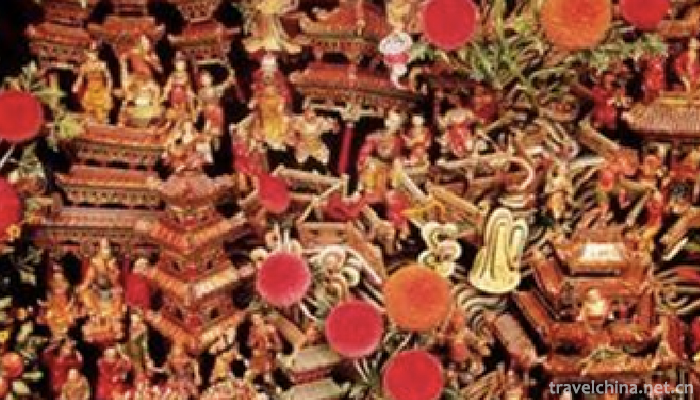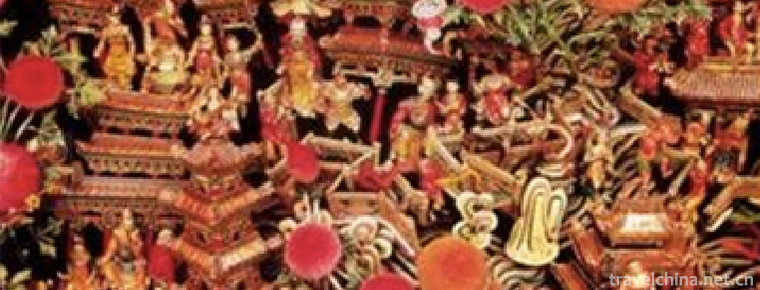Sweat green
Sweat green
"Khan Qing Gele" is a heroic epic of the Mongolian people in Haixi. In the form of rap and speech, it tells the story of the Mongolian heroes destroying demons and saving the people, flashing the wisdom of the Mongolian people in pursuit of a better life.
In June 2008, the "Khan Qing Gele" declared by Haixi Mongolian and Tibetan Autonomous Prefecture of Qinghai Province was listed in the second batch of national intangible cultural heritage list with the approval of the State Council.
Heritage serial number: 557 I-70.
historical origin
The Hercynian heroic epic Khan Qing Gele in Haixi, Qinghai Province, has the special local characteristics of Haixi. It is a folk artist of the Hercynian Mongolian nationality who, in the form of rap or speech, vividly reflects the history and social life and production of the Mongolian nationality in plain language. In the heroic epic, the intense war between heroes is mainly aimed at expanding the grazing land with abundant water and grass, plundering population, beauty, horses, livestock and property, or revenging blood and kin. It shows people's desire to conquer nature, pursue happiness, and abhor the dark forces of the old times. It flourished at the end of primitive society and at the beginning of slavery.
primary coverage
Qinghai Mongolian heroic song and dance epic "Khan Qing Gele" governs the Northwest Plateau of Bayin Hudel Alaten Khan's Prince Khan Qing Gele to marry far away. On the way, they met the hunter Made Wulan, and they went together. The two passed through three difficulties and went to the girl's home. But at the same time, the God Kuleghu and Battle came to marry. The two sides could not argue. The girl's father (Bali Magzhil Khan) proposed to use wrestling, archery and horse racing to decide who would marry the girl who took him. After a fierce competition, Khan Qing-gler defeated God's Kuleghu and Bartel and married Naren Zandan as his wife. When he returned to his Khanate, Pythagus robbed Khanqingler's father and his family's property, leaving his home in ruins. Khan Qinggler went to Pythagus for revenge. Khan Qinggler overcomes many hardships on his way to find Pythagus. Eventually, he kills the vicious Pythagus, defends his hometown, rescues his relatives, returns to the capital of the Khanate Kingdom to hold a grand wedding and live a happy life. The epic embodies the noble moral character of Khan Qing-gler, who loves his hometown, motherland and people, advocates the spirit of heroism and advocates people's pursuit of a peaceful, free and equal life.
A variant of Khan Qing Ge Le, which is popular among the Mongolian people in Qinghai and Subei counties, also describes that with the help of the Jieyi brothers, the hero Khan Qing Ge Le, through his father-in-law's three competitions of horse racing, archery and wrestling with heroes, has countless Mongolian epic poems that test the marriage type of the wife and hero by marrying the Zandan girl.
The epic "Khan Qing Gele" recorded by Schinbachtu in 2006 is transcribed as it is, without modification. In addition, the epic "Hudel Altaihan" sung by Robson in Slavic by Tubai and Cao Lumeng of the Language Investigation Group in 1957 in Subei County, Gansu Province, was also published here according to the records.
Inheritance significance
This heroic epic is rare in Mongolian folk literature and has important historical research value. The Hercynian heroic epic Khan Qing Gele is a wonderful flower in the Mongolian cultural treasure house, which contains the wisdom and wisdom of the Mongolian people, and is praised by scholars both inside and outside the province as one of the three peaks of Mongolian folk literature in Qinghai.
Inheritance and protection
Among the second batch of national intangible cultural heritage lists and the first batch of expanded intangible cultural heritage lists published by the State Council, Haixi Mongolian Tibetan Autonomous Prefecture of Qinghai Province has two intangible cultural heritage lists. Among them, the Hercynian heroic epic "Khan Qing Gele" was listed in the second batch of national intangible cultural heritage list.
Influenced by Qinghai's natural environment, in the process of inheritance, there are variations, with strong regional characteristics of the West. Hercynian Mongolians call "heroic epic" as "Tuji", and their rappers as "Tujiqi". The number of Tujiqi in the world is very small, and they are old enough to face the crisis of inheritance and need to be rescued and protected urgently.


-
1.Sliced Fish in Hot Chili Oil
Boiled fish, also known as river boiled boiled fish and boiled fish fillet, was first popular in Cui Yun Township, Yubei District, Chongqing.
Time 2018-10-27 -
2.Fish egg powder
Fish egg powder was originally a food in Chaozhou. It began to spread to Guangzhou in the Guangxu period. Today, the operation of Chaozhou
Time 2018-11-14 -
3.Bao Zhai village
Baoqiao Village, formerly known as Baoqian Mountain and Qishan Mountain, is located in Luquan District of Shijiazhuang City, 16 kilometers away from Shijiazhuang, the provincial capital
Time 2019-01-02 -
4.Jinxi ancient town
Jinxi Ancient Town is located in the southwest of Kunshan City, Jiangsu Province. It is 100 kilometers from Shanghai Pudong International Airport and 75 kilometers from Wuxi Airport.
Time 2019-01-29 -
5.Wulingyuan
Wulingyuan Scenic Spot is located in the northwest of Hunan Province, central China. Its longitude is 110 20'30 ~110 41'15 and latitude is 29 16'25 ~29 24'25
Time 2019-02-24 -
6.Xishuangbanna Mengwan Great Buddhist Temple
Situated in the suburbs of Jinghong City, the prefecture of Xishuangbanna Dai Autonomous Prefecture, Yunnan Province, the Monastery is built according to the national AAAA standard.
Time 2019-02-25 -
7.Eyebrow household
Eyebrow households, distributed in Shanxi, Shanxi, Shaanxi, Gansu, Western Henan and other provinces, also known as "Eyebrow Shao" or "confusion", are named for their euphemistic m
Time 2019-05-31 -
8.Western Qin Opera
Western Qin opera, also known as "chaotic play", is popular in Haifeng, Lufeng, Chaoshan, southern Fujian and Taiwan. Western Qin Opera flowed into Hailufeng in the northwest of the Ming Dyn
Time 2019-07-01 -
9.Yandi Festival
"Yandi Mausoleum Festival" is divided into official and folk sacrifices. Folk sacrifice began in summer, official sacrifice originated in Zhou, and Emperor sacrifice originated in Tang Dynas
Time 2019-07-10 -
10.China University Of Geosciences
China University of Geosciences is known as "Da Da". Ministry of Education of the People's Republic of China Directly under National Key Universities It's the state. 211 Project ","
Time 2019-12-08 -
11.Huahu Lake
Huahu is located on the 213 national road between Ruoergai in Sichuan Province and Langmu temple in Gansu Province. It is a natural Haizi on the grassland of GER dam. Geer dam is the second largest grassland in China after Hulunbeir Grassland
Time 2020-11-07 -
12.Panzhihua from the Ming Dynasty to the Republic of China
In 1382, in the 15th year of Hongwu reign of the Ming Dynasty, the Xuanwei Department of paloros put Yunnan under the jurisdiction of Sichuan Chengxuan political envoys. In this place, there is another commander's Department of Sichuan Xingdu, which leads the lawsuits
Time 2020-12-14